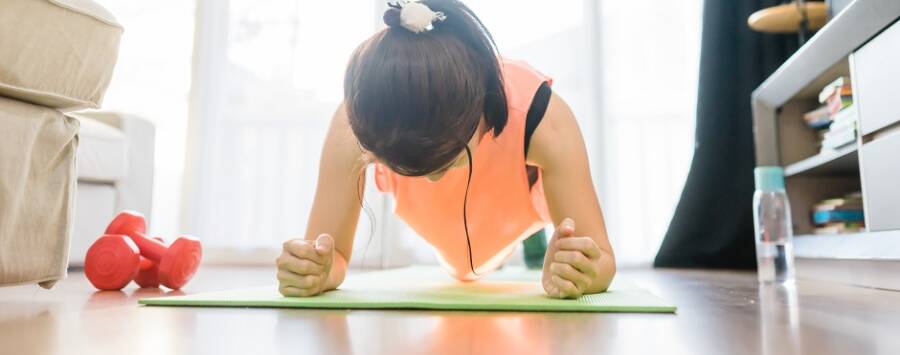- Physical activity releases “feel good” endorphins (serotonin, dopamine, etc.) in the brain that can counteract the negative effects of anxiety or sadness and put us in a better, more positive mood. In addition, exercise can decrease the hormones that cause stress and put us “on edge” or into heightened levels of anxiety. Between boosting the good chemicals and helping reduce the negative, exercise does a lot within our brain at a microscopic level that can help us feel more relaxed and less anxious.
- Exercise is easy to implement and inexpensive or even free of charge. Riding a bike, going for a walk, utilizing yoga videos from YouTube, running along trails, or pickup basketball – the possibilities are endless for free or cheap workouts that can satisfy a myriad of interests. These opportunities also don’t take much planning and only require us to get started to feel the benefits.
- Self-esteem and personal confidence are often increased when we work out. As we develop an exercise regimen, we begin to push ourselves to increase reps, weight, distance, etc. and view these challenges as a fun part of our day. Being able to reach a new goal gives us a sense of accomplishment and helps us feel like we were productive. These feelings, as well as changes in personal appearance or ability from physical exercise, can make us feel more confident and help eliminate a source of stress many of us feel or struggle with.
- Working out is a great distraction from the present and can draw our attention away from problems for a brief amount of time. Many workouts, whether individual sweat sessions or competitive games, make us focus on the task at hand and think about what our bodies are doing. By requiring us to think of something different and walk away from what is causing the anxiety or stress, we may be able to take a deep breath and come back with a different perspective or ability to refocus. Oftentimes we don’t need to walk away completely, but rather step back and come at our thoughts from a different angle. Exercise gives us a great way to take a break and put ourselves in a more positive position moving forward.
- Physical activity is also a great way to create a support system and spend time with other people doing something we enjoy. Even now, while we can’t physically go workout out with others due to the social distancing guidelines caused by the COVID-19 virus, having an accountability partner or group to be active with can do wonders for our mental health. Try talking to people on the phone while going for a walk, doing a virtual workout with others, or challenge each other to try a new workout to satisfy our human need for interaction and our drive to be connected to people that enjoy the same things we do. Having a support system can make everything feel less stressful and put us in a better frame of mind even if we can’t be together physically.
While it may seem like starting an exercise program is a daunting commitment, the mental health benefits are well worth it! Find a hobby you enjoy and begin using physical activity as an outlet to get a break from the consistent anxieties and stresses being thrown at us.
If you’re experiencing any aches and pains, schedule an appointment and be seen in-clinic or virtually through a secure online video chat.
The Athletico blog is an educational resource written by Athletico employees. Athletico bloggers are licensed professionals who abide by the code of ethics outlined by their respective professional associations. The content published in blog posts represents the opinion of the individual author based on their expertise and experience. The content provided in this blog is for informational purposes only, does not constitute medical advice and should not be relied on for making personal health decisions.

 width="900"
height="355"
>
width="900"
height="355"
>

2 Comments
Bruni Johnson
Thank you, great suggestions.
Question? I overdid it a bit at my age (83) with gardening and hard work and since I have a torn a right shoulder rotary cuff (sp.?) I have pains at night in my right arm again and even my middle finger. I do all the exercises gained from your outfit’s therapy, but it still bothers me at night.
Are you open for treatment if I get a prescription? Or what do you suggest?
Athletico
Hi Bruni, we are open both in-clinic and virtually with online appointments. Please contact an Athletico nearest you by visiting https://www.athletico.com/locations.